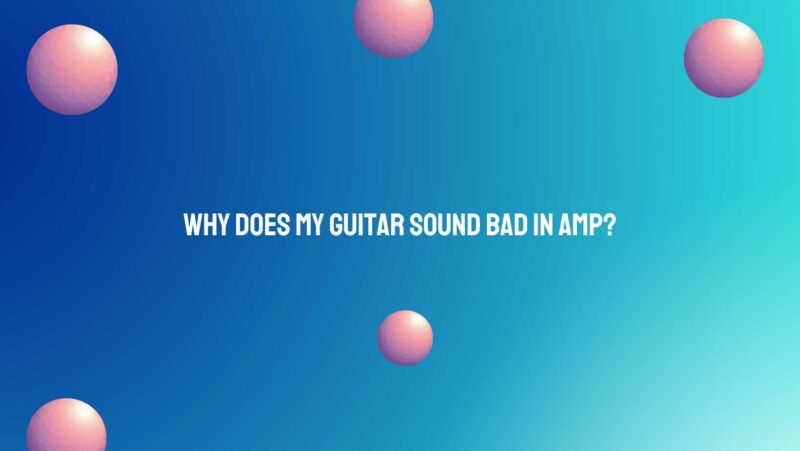If you’ve picked up a guitar and plugged it into an amplifier, only to be met with a less-than-ideal sound, you’re not alone. Many guitarists, both beginners and seasoned players, have encountered this issue at some point. While it can be frustrating, the good news is that there are usually identifiable reasons for poor guitar tone through an amp. In this article, we’ll explore some common causes and solutions for why your guitar might sound bad through an amp.
- Poor Cable Quality
One of the most overlooked factors affecting guitar tone is the quality of the cable connecting your guitar to the amp. Low-quality or damaged cables can result in signal loss, interference, and a loss of high-end frequencies, leading to a dull and muddy sound. To address this issue, invest in high-quality instrument cables and check them regularly for damage.
- Amp Settings
Sometimes, the culprit behind a bad guitar tone is simply the amp settings. Tweaking the knobs and switches on your amplifier can make a world of difference. Experiment with the EQ (equalization) settings, gain, volume, and reverb controls to find the tone that suits your style. If you’re unsure where to start, consult the amp’s manual or look up recommended settings for your particular amplifier model.
- Guitar Setup
The condition of your guitar and its setup can significantly impact the tone. Problems like old or worn-out strings, improper intonation, or a poorly adjusted truss rod can result in a lackluster sound. Regular maintenance and setup adjustments by a professional luthier or guitar technician can help optimize your guitar’s performance.
- Guitar Pickup Selection
The type of pickups in your guitar plays a significant role in the tone it produces. Single-coil pickups tend to have a brighter, clearer sound, while humbuckers offer a warmer, thicker tone. If your guitar isn’t producing the sound you desire, consider experimenting with different pickups or adjusting the pickup height to fine-tune your tone.
- Room Acoustics
Your physical environment can also impact your guitar’s sound. A room with poor acoustics, such as too much reverb or background noise, can make even the best guitar and amp combination sound bad. Try playing in different rooms or consider adding acoustic treatment to your practice space to improve the overall sound quality.
- Speaker Quality
The quality and condition of the speaker in your amplifier matter greatly. If your amp has a low-quality or damaged speaker, it can result in distorted or muffled sound. Replacing the speaker with a higher-quality one can make a significant difference in your tone.
- Pedals and Effects
If you use pedals and effects in your signal chain, they can have a substantial impact on your guitar’s tone. Sometimes, a combination of pedals or incorrect settings can lead to undesirable results. Experiment with your pedal settings and the order of your effects to achieve the sound you desire. Additionally, make sure your pedals and cables are in good working condition.
- Amplifier Maintenance
Amplifiers, like any electronic equipment, require regular maintenance. Dust and debris can accumulate inside your amp, affecting its performance. If your amp has been sitting unused for a while or shows signs of wear, it might be time for a professional inspection and cleaning.
- Inadequate Playing Technique
Sometimes, the problem isn’t with the gear, but with the player. Poor playing technique can result in a bad guitar sound through an amp. Ensure that you’re fretting notes and chords cleanly, picking or strumming with consistency, and using proper palm muting and dynamics to shape your sound.
Conclusion
A bad guitar sound through an amp can be a frustrating experience, but it’s rarely a mystery. By systematically checking and addressing the factors mentioned above, you can improve your guitar’s tone and make the most of your amplifier. Remember that achieving your desired tone often requires patience, experimentation, and a willingness to learn. Whether you’re a beginner or an experienced guitarist, understanding these factors will help you unlock the full potential of your instrument and amp combination, allowing you to create the perfect sound for your music.


